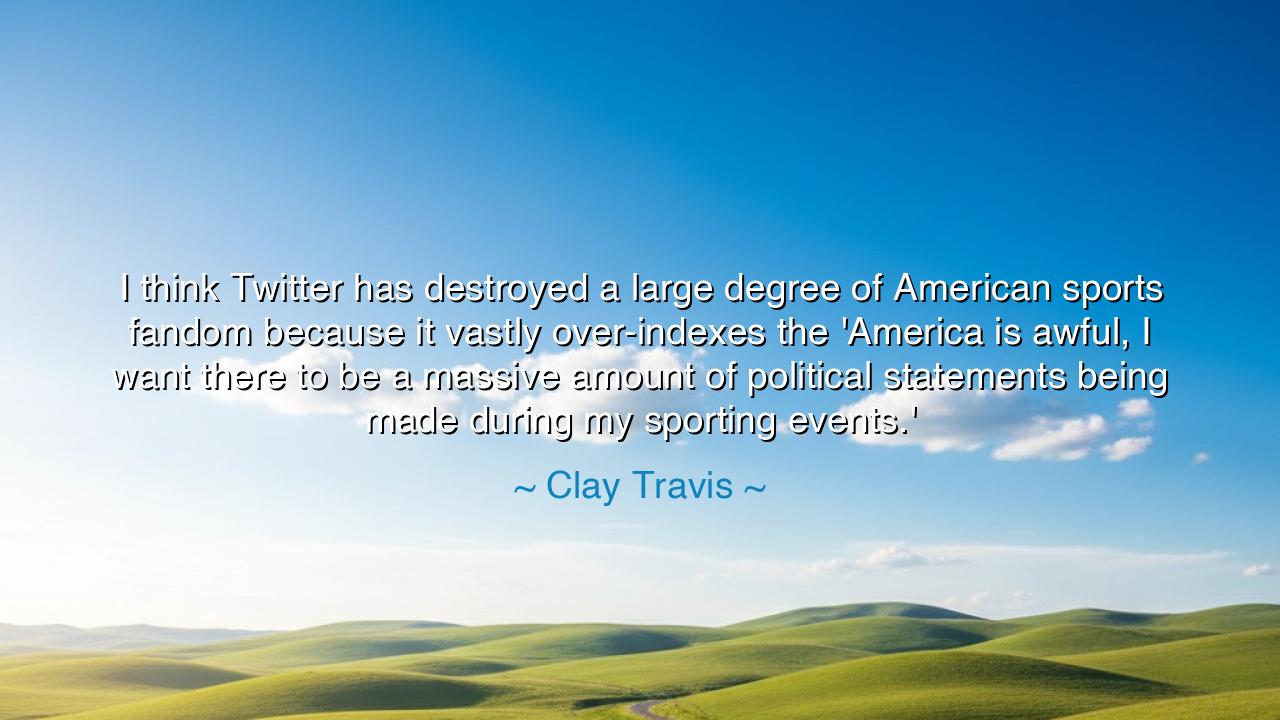
I think Twitter has destroyed a large degree of American sports
I think Twitter has destroyed a large degree of American sports fandom because it vastly over-indexes the 'America is awful, I want there to be a massive amount of political statements being made during my sporting events.'






Hearken, O seekers of insight, and attend the words of Clay Travis, who spoke with concern for the heart of communal experience: “I think Twitter has destroyed a large degree of American sports fandom because it vastly over-indexes the 'America is awful, I want there to be a massive amount of political statements being made during my sporting events.'” In these words lies a meditation on the power of distraction, division, and the shaping of collective attention, and a caution against the intrusion of external contention upon spaces meant for unity, joy, and admiration of human skill.
The origin of this insight rests in Travis’s observation of contemporary sport as both spectacle and cultural forum. Sports have long been a domain where communities gather, where triumph and defeat are celebrated, and where allegiances unite rather than divide. Yet, with the rise of social media, platforms such as Twitter have magnified voices of dissent, turning moments of athletic endeavor into arenas for political conflict and critique. Travis laments that the purity of fandom—the celebration of excellence, courage, and teamwork—is being overshadowed by commentary that seeks to politicize every action.
Consider the story of the 1936 Berlin Olympics, where the triumph of Jesse Owens in the face of Nazi ideology became an emblem of athletic excellence surpassing politics. While the Games were heavily politicized, the achievement itself inspired awe across nations. The focus remained on human performance, skill, and dedication, rather than being entirely subsumed by ideology. Travis contrasts this with the modern landscape, where instant commentary and political framing can overwhelm the appreciation of sport itself, diverting attention from the virtues that make the games compelling.
Yet Travis’s critique is not a call for ignorance or silence regarding justice, but a plea for balance. He observes that social media often amplifies outrage, favoring voices that demand spectacle over reflection. The consequence is a fragmentation of fandom: those who seek the thrill of athletic excellence find themselves immersed in political conflict, while the shared joy of the game becomes diminished. The arena, once a unifying space, risks becoming a battlefield for ideology rather than a celebration of human endeavor.
The ancients understood the importance of preserving spaces for communal admiration. In Greek theaters and Olympic stadia, citizens witnessed contests and performances that celebrated courage, skill, and artistry, separate from civic strife. While politics and philosophy were discussed elsewhere, the arena was a sanctuary of shared awe and collective engagement. Travis’s observation echoes this principle: distraction and division, when imposed upon spaces meant for unity, erode the shared experience and diminish its value.
From this reflection, a lesson emerges: recognize the power of context and focus. Sports, art, and communal celebration are enriched when appreciated in their own domain, with attention devoted to the mastery and effort of participants. While the world beyond the arena may be fraught with conflict, the ability to witness and cherish achievement without interference cultivates perspective, joy, and admiration for human endeavor.
Practical action follows: engage with sports consciously, separating critique from observation when appropriate. Use social media with discernment, preserving spaces for genuine appreciation and communal experience. Celebrate skill, perseverance, and excellence on their own terms, allowing the collective joy of fandom to flourish without being overshadowed by the incessant demands of political discourse.
Thus, let the words of Clay Travis endure: the intrusion of distraction, amplified by platforms such as Twitter, can erode the heart of fandom. Guard the sanctity of shared admiration, cultivate spaces where the spirit of sport is honored, and remember that the celebration of human skill, courage, and teamwork deserves attention unclouded by division. In doing so, the timeless joy of the games may continue to unite, inspire, and uplift all who bear witness.






AAdministratorAdministrator
Welcome, honored guests. Please leave a comment, we will respond soon